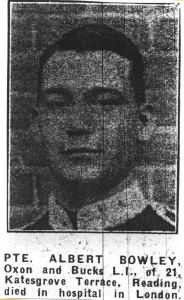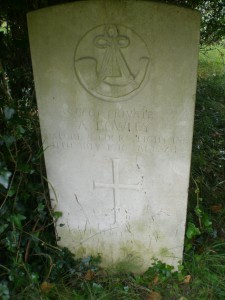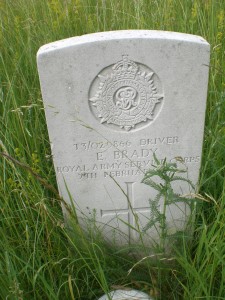Herbert Arthur Boyes
Air mechanic 2nd Class 42524
Royal Flying Corps.
War Plot
Division 71 and 72
In 1911 Herbert Arthur Boyes (26) had been married for less than one year to his wife Beatrice Annie Boyes (24). He was a carpenter working for a builder and the couple were living in his home town of York.
He started his working life as an apprentice to an ironmonger. His parents were Arthur and Maria Boyes and Herbert was the second of four sons, he also had a younger sister.
The story of the death of Herbert Boyes is another side to the tragedy of the war.
Herbert Boyes was the husband of Beatrice Annie Boyes of 18, Alma Street, Beckett St. Leeds.
The Mercury April 7th 1917 (page. 6) gave an account of the Suicide of Air Mechanic Herbert Boyes under the headline of:
“Suicide of soldier – Depressed through failing sight”
The report states – Herbert Boyes ” took his life by hanging himself”.
Captain E.F. Vaughan, adjutant at the technical training school Coley Park, represented the RAF.
“Mrs Beatrice Annie Boyes, widow of the deceased, said the latter was 32. She saw him last at Leeds the previous Tuesday. He had been there with her for six days. He had not been well during his stay, complaining of his sight and pains in his head.
He came from Farnborough to Reading some months ago, and went into hospital. He was most interested in his work, being quite satisfied with the Army, but was depressed about his sight. When it became worse he said he should put an end to himself, but if it got better he felt confident that he should get on in the Army, and looked forward to promotion. His sight was the only thing that worried him.
….he was found hanging by a railway worker “Round his neck was a khaki handkerchief”.
The deceased had joined the school in September but was admitted to hospital on October 17th and discharged March 19th. He had been suffering form optic neuritis. On leaving hospital he had been granted six days leave. He overstayed his leave for nearly a day, saying he was too ill to travel. His statement being verified no punishment was meted out to him. He was only with the Royal Flying Corps for 20 days. He was a good worker with nothing against him……
Verdict “suicide during unsound mind”.
Herbert Boyes is buried in the war plot and his name is commemorated on the screen wall. He was found dead on the 31 March 1917. He was 32 years old.


